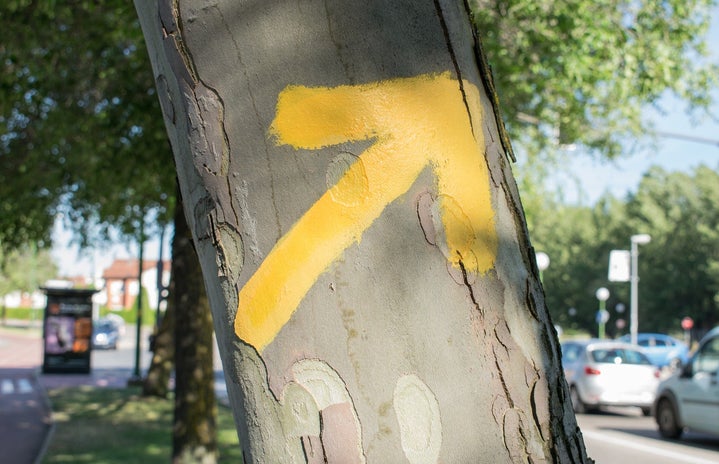In my creative writing class, we often discuss the importance of taking the pressure off of yourself while writing. Many of my classmates have noted their anxiety and reluctance while experimenting with writing, and I know many of my friends struggle in the same way. But despite my anxious personality, I have never found creative writing to be a particularly stressful hobby, and rare is it that I struggle with anxiety about writing a piece.
I don’t know if I’m comfortable with it because I’ve been writing for a decade already or because I’ve already read published work that is bafflingly bad, but here are my tips for taking the pressure off while writing and getting your creative juices flowing.
Altered States
OK, yes. Ernest Hemmingway, Tennessee Williams, F. Scott Fitzgerald. Many of the world’s most famous writers were addicts — it’s a chicken or the egg sort of situation. I don’t recommend making it a habit or a crutch, but I cannot emphasize enough the effectiveness of writing in a state other than total sobriety.
Tired
My best pieces have come out of a state of sleep deprivation. I don’t know what it is about tiredness, but you know how nothing/everything makes sense? For whatever reason, at least for me, that transfers beautifully onto the page. I personally recommended doing all your reading for class (or lots of reading in general — Epic of Gilgamesh worked really well for me) until you’re exhausted and then writing, with or without a prompt.
I recommend writing from this state most when you are starting with nothing or with only a vague idea of what you want to write (it works very well for creative writing homework, for instance).
Drunk
Yeah, I’ve done it. Yeah, it’s because I want to be Hemmingway. Yeah, it was amazing. Many writers have credited alcohol for its inhibition-lowering powers, which very well might be why it helps writers produce insightful work examining pieces of life that a sober mind may overlook or be reluctant to investigate. Personally, I’ve found that the state between tipsy and drunk really enhances my ability to write descriptions and follow plot.
Some people struggle to stay on task while drunk writing, so I don’t recommend trying this out with a looming deadline. I feel like that should go without saying.
Writing badly
What’s better than a blank page? Here’s a hint: anything! No, a blank page isn’t something to fear, and it can be an ally, especially when you’ve been working on something for a while and need a fresh view. But many of my classmates put a lot of pressure on themselves to write beautiful, eloquent prose immediately. This is a mistake! Sometimes, words will flow from your brain to your fingers seamlessly, and an incredible piece will materialize before you, seemingly without your intervention. But these are exceptional experiences.
This is particularly true when you are working from nothing. If you have a plot outline or an idea of how a piece will go, inspiration will wane and there will be many moments of stillness through which you will have to push. The best way to do this is badly.
Just write! Write “Jimmy and Carlisle have a conversation about what happened at the Mill. Carlisle wants to be a friend. Jimmy is an asshole because his dad is dying.” You don’t have to have everything figured out. Just write what you know right now – spill it on the page as poorly as you can so it’ll be less sentimental when you go in to fix it later. Make notes of what is going on under the surface. Make notes of everything you know, but don’t worry about form or quality.
Clearing your Throat
I almost always realize after a few paragraphs that the way I have started my piece doesn’t fit with the tone or the logical flow of action. Usually, I end up scrapping the first few paragraphs entirely and starting from a different perspective or moment or thought. My creative writing professor calls this “clearing your throat.” Sometimes, you have to write a few paragraphs to put yourself into the story before you actually start producing usable work. This is a good thing. It gets you started with your story without needing to have everything figured out – and the realization that what you’re writing isn’t working is an indication that you have a good understanding of how your story works.
Bullshit: Quantity Over Quality
Every word improves your writing abilities. Period. I spent a decade of my life writing absolute bullshit that nobody will ever read – including me – and it has done wonders for my writing. Write when you feel like it. Write when you don’t. Write consistently and inconsistently. Keep a journal. Write letters to people that don’t exist – and those who do. Write lists and fanfiction and your opinions and about how much you want it to be fall. Just write, and you will improve. Even if it doesn’t seem like it.
Content
So, I’ve told you that all writing is productive writing – in that spirit, here are some of my favorite creative writing exercises for when I have no idea what to write about.
Character Sketches
My new favorite writing exercise is the character sketch.
I used to hate character sketches, but I’ve recently discovered the hidden value of them. Here’s what I do:
-
Have a character in mind. I’ll be honest, I hate making up entirely new characters just for exercises, but I also hate taking my characters for walks around the block. I’ll admit it: I write about real people. I love to take people who I know very little about and imagine what their home is like. Why do they do [x]? I don’t know. Let’s figure it out. I find the most annoying or confusing people make the best subjects.
-
Have a question. Do they have the home life they want? How do they feel at the end of the day? What is their internal monologue like? Do you feel creepy yet? Good, you’re supposed to. Being a writer is delving into the most private parts of someone’s mind and harvesting the best parts – without permission. I will say, I always change the details a little and never use their names. I never share it with anyone, anyway, but it makes me feel better.
-
Find their voice. My favorite part about this exercise is that it allows you to experiment with voice without having to make one up yourself. Think about the way they speak: the words they use, the syntax, the accent. Anything that makes their speech uniquely theirs is ripe for the taking, and, by experimenting with it, you can add it to your personal writing arsenal for later use.
Tip: One thing I love to do is have an internal monologue going and compare that with their speech to others. They probably sound different in their heads than they do out loud. Why? How do they differ?
Writing about yourself
Ah, Mary Sues. The bane of every fanfiction consumer and the #1 fear of all female writers. Well, I’m giving you permission to use them.
So what? First of all, Mary Sues are everywhere, and we love to read about them. Secondly, as I said, it’s quantity over quality, and you don’t have to share your work with anyone.
And Mary Sues are FUN! Are you kidding me? Don’t let snobs tell you what is and is not acceptable. Do you want to go on a fantasy adventure? Guess what? You probably won’t. But you can write about yourself going on a fantasy adventure. You don’t have to make a Distinctly Not You character. Just write about it. Jane Austen wrote her original character into Pride and Prejudice and we all busted a nut. You can write about yourself narratively in Google Docs. Live vicariously through your own writing. It’s fun, I promise. Feels weird? Use a different name. Make it your ideal self. Do whatever you want! We’re all barreling towards an uncertain death, anyway. Just write.
Dialogue Only
We are all engaged in dialogue constantly, and yet most of us are pretty awful at writing it. It’s okay. It takes practice. But one thing I’ve found fun and easy is to write dialogue-only exercises. Text conversations are super fun to write because there is no body language to cut out. I also love experimenting with how emoticons and other text-specific features are used differently by different characters. Ever read Homestuck? Don’t, but it plays with this idea a lot.
It’s also nice to try to follow a simple plot using only dialogue. And no tags, either. Try to make each character distinctive without making it distracting.
Remember, everything you write has intrinsic value to you. Even if it sucks, and even if you don’t like it. Every time you write, you improve, and every time you experiment with a new idea or style or form, you become a more flexible and skilled writer. Good luck!


